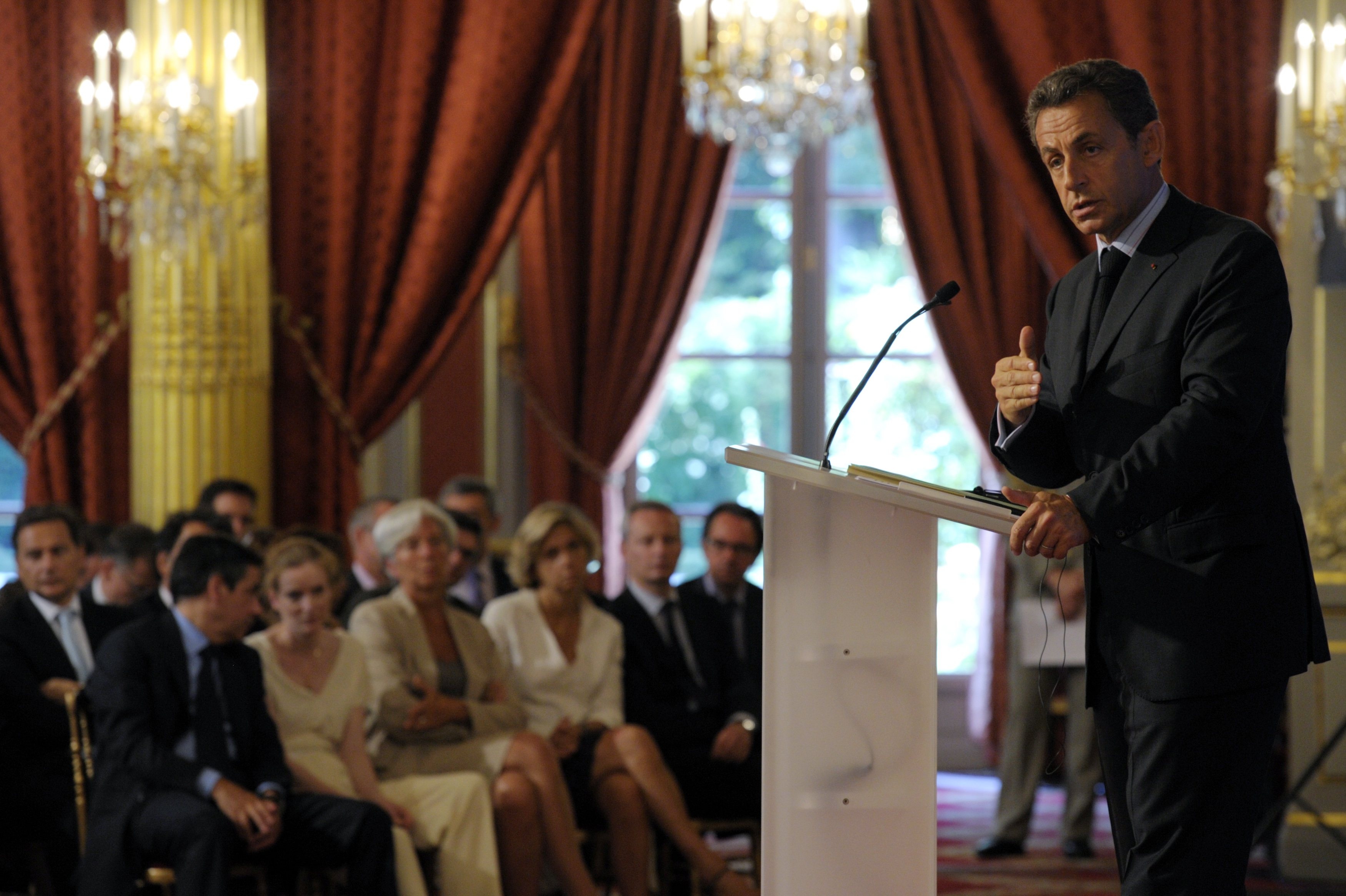
French President Nicolas Sarkozy at the Jun. 27 news conference at the Elysee Palace in Paris. (Photo: Reuters / Philippe Wojazer)
Could the end of the Greek debt crisis be in view—and with it the pressure that has put the very future of the euro in jeopardy? That’s the hope behind a draft deal French President Nicolas Sarkozy confirmed Monday, under which France’s private banks holding some $21 billion in Greek sovereign debt would roll nearly 70% of that over for 30 years. If that accord can be finalized in France and concluded in other European countries holding large volumes of Greek debt, the development could provide Greece some badly needed breathing room to get its severely troubled financial house in order–and help protect the euro from the threat of implosion it faces. During only his fourth Elysée press conference in as many years, Sarkozy on Monday confirmed a report in the daily le Figaro that French treasury officials and private banks holding Greek debt had agreed to a deal that—it was hoped—could become a model for other creditor nations in Europe. Central to it was the agreement by French banks to roll over around 70% of their Greek debt by reinvesting matured loans repaid by Athens into new securities—primarily 30-year bonds. Those would be issued at moderate rates of interest, plus a premium indexed on future Greek growth that would not only be made possible by the new bank help on debt, but necessary for Greece to even repay existing and rolled-over liability.
“We concluded that by extending loans over 30 years, putting (interest rates) at the level of European loans, plus (creating) a premium indexed to future Greek growth, that would create a system that each country could find attractive,” Sarkozy told journalists Monday, noting the hope now was to get other European nations and their private banks to agree to the same plan in defense of their common currency. “The idea is that we won’t let Greece fall. We will defend the euro–it’s in the interest of us all.”
It’s far from certain yet whether all France’s main euro partners will follow suit. German officials confirmed authorities there were involved in talks with private banks and financial companies about adopting framework similar to the French plan. The move reflects earlier insistence by German officials that private businesses participate in addressing the Greek crisis alongside taxpayer-funded government efforts. It’s unclear whether German banks are close to accepting such a deal, however.
Meanwhile, news reports from Rome Monday say meetings there between euro zone officials and those representing international banking and finance industries are also discussing the French plan, though there’s no indication the initiative is finding wider support among participants yet. And perhaps for good reason: without the very tight relationships between government and business leaders that exist in France—and give French politicians more influence in shaping (or meddling in) private sector affairs than elsewhere—it’s unclear whether heads of financial companies in other nations could be similarly convinced to reconfigure billions in their investments in the public service interests of helping the Greek economy, and with it European countries using the euro.
However, reaching an outline agreement in France was at least a start towards that—even if it was the most likely place to find the private sector agreeing to help politicians in crisis mode. In addition to the close relationships between French government figures and business leaders, French banks are also the most exposed in Europe to Greek debt, and therefore have the most to lose among private players were Athens to default. Getting a similar accord is also essential in Germany, whose banks hold a larger global volume of Greek debt. But as in France, political pressures are also at work in Germany. Chancellor Angela Merkel has been adamant about private lenders assisting the government in taking financial steps to respond to the crisis—including, if need be, taking hair cut” on loans to Greece if need to avoid default. Until Monday’s news of the French draft agreement, however, banks had seemed unwilling to pitch in.
But even if similar accords can be hashed out in most euro zone countries, it might not be enough to end the current crisis. Markets and credit rating agencies could wind up interpreting the deal as governments brow-beating their banks into taking hits as a manner of avoiding the wholesale default. In other words, observers might lament such moves as conniving and artifice to prop up the euro by allowing Greece to avoid declaring bankruptcy–but without changing the seriously rotten fundamentals that have produced the produced the crisis in the first place. Indeed, some critics say European bail out packages to Greece—an initial $158 billion package, and another $170 billion grant in the pipes—have neither lightened Greece’s primary debt pressure, nor calmed market fears about eventual default that have exacerbated the situation by driving costs of new borrowing sky-high. Pessimists argue there are really only two radical solutions left for a radical problem: for banks to agree to massive write-downs, or—failing that very improbable move—allowing Greece to default, accepting the euro consequences that follow, and start over anew from the ground up.
Since those scenarios are unrealistic and unthinkable to banks and governments respectively, the best hope now is for the French deal somehow being negotiated into place elsewhere in Europe. It might not produce a miracle, but it would at least give governments—and the euro—a better chance to overcome the crisis. After all, getting banks on governments’ side as partners in the face of financial calamity is a heck of a lot better than having them standing by and waiting to collect from whatever’s left from whomever manages to survive.

